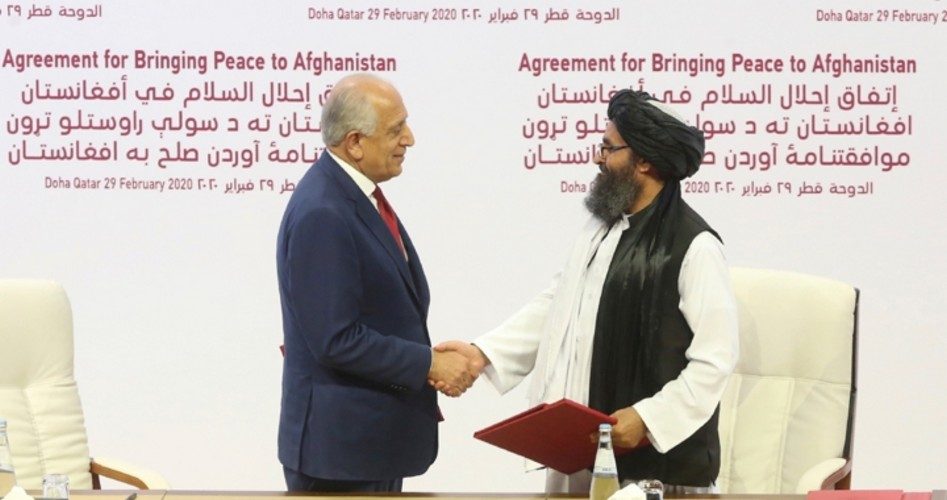
With an agreement signed on Saturday in Doha, Qatari, U.S. special envoy Zalmay Khalilzad and Mullah Abdul Ghani Baradar, the political leader of the Taliban, there is hope that President Donald Trump’s campaign pledge to extract America from its “endless wars” will come true.
If the war in Afghanistan is really over, will it serve as a warning to the political leadership of the United States that getting into a war is far easier than getting out of one? This war began after the September 11, 2001 attacks upon the United States by agents of al-Qaeda, then led by Osama bin Laden. At the time, bin Laden was residing in Afghanistan, as an honored guest of the Taliban government then running the country.
Congress quickly authorized the use of military force against those behind the 9/11 attacks, and U.S. forces invaded Afghanistan for the stated purpose of capturing bin Laden and overthrowing the Taliban government that had supported him. It is uncertain what role — if any — the Taliban government had played in instigating the 9/11 attacks upon the World Trade Centers in New York City, and the attack on the Pentagon just outside Washington, D.C.
The decision to invade Afghanistan was initially very popular and supported across the political spectrum. Even then-Congressman Ron Paul of Texas supported it. Paul voted with for the original 2001 Authorization for Use of Military Force, which passed almost unanimously (in fact, there was only one “nay” vote in the House). Despite this initial support, Paul eventually advocated the withdrawal of troops from Afghanistan. For instance, in 2010 he stated, “There really is nothing for us to win in Afghanistan. Our mission has morphed from apprehending those who attacked us, to apprehending those who threaten or dislike us for invading their country, to remaking an entire political system and even a culture…. This is an expensive, bloody, endless exercise in futility, though few are willing to admit this just yet. But every second they spend in denial has real costs in lives and livelihoods.”
Indeed, the war cost the U.S. nearly a trillion dollars and more than 2,400 lives in the nearly 18 years of fighting.
As has been the case so often since World War II, as Paul said, the U.S. government expanded its mission from retaliating against those who had attacked the country into what has been dubbed “nation-building.” One would have thought that the lesson of Vietnam would have been learned when the Kennedy Administration deepened our involvement in that country so as to make it a “showcase for democracy” in Asia. A similar effort has been mostly a failure in Iraq.
Yet, there are those in and out of the U.S. government, called by various names such as “neoconservatives,” who support foreign interventions not so much to defend the national security of the United States, but to try, as Paul said, remake “an entire political system and even a culture.”
The growing frustration of Americans over these wars that seem to never end, is a large reason why Donald Trump was able to win the 2016 presidential election. And now, an agreement has been signed, for the purpose of ending one of them.
Specifically, the agreement calls for the gradual withdrawal of U.S. troops, contingent upon the “performance” of the Taliban in living up to the agreement to stop fighting against the Afghan government. Whether this will happen is uncertain. Michael O”Hanlon, a scholar with the Brookings Institution, has expressed concern that the agreement could be a repeat of the one signed by the United States with the communist North Vietnamese in 1973, “where we basically take on faith that the enemy is going to behave itself once we’re gone.”
Of course, the North Vietnamese launched the largest military offensive since World War II in 1975, and when Congress cut off funding for the South Vietnamese army it essentially ran out of ammunition and succumbed to the attack in May 1975.
The Taliban also promises to end support for “terrorist organizations,” and not allow the country to be used as a base of operations for groups like al-Qaeda and ISIS. Retired Army General Douglas Lute, who served in the Afghanistan War for both Presidents George W. Bush and Barack Obama, said, “We have largely achieved our counter-terrorism objective today,” noting that most of the senior leaders of al-Qaida have been either killed or “marginalized.”
Another important part of the deal is an exchange of prisoners. Here the concern is that freed Taliban soldiers could simply return to the battlefield, despite the deal’s stipulation that this not happen.
The agreement is to be followed by talks between the Afghan government and the Taliban.
Finally, the status of women in a post-war Afghanistan needs to be resolved. Under the Taliban, women were prohibited from going to school, working, or even going out in public without a male relative escorting them. Interestingly, the deputy Taliban leader, Siraj Haqqani, said that women in Afghanistan will have all the “rights of women that are granted by Islam.” Of course, the problem there is that the Taliban interprets Islam in such a way that women really do not have very many “rights,” illustrated by the infamous requirement that they wear burqas outside the home.
This, however, raises the question as to what should be the role of the American military. Should the United States go abroad and attempt to use military force to make foreigners act in the way that Americans think they should act? After nearly two decades of occupying Afghanistan, it is apparent that doing that is extremely difficult, and requires the expenditure of America lives and treasure.
Steve Byas is a university instructor of history and government and the author of History’s Greatest Libels. He may be contacted at [email protected].
Photo: U.S. envoy Zalmay Khalilzad and the Taliban’s top political leader Mullah Abdul Ghani Baradar shack hands after signing a peace agreement: AP Images



